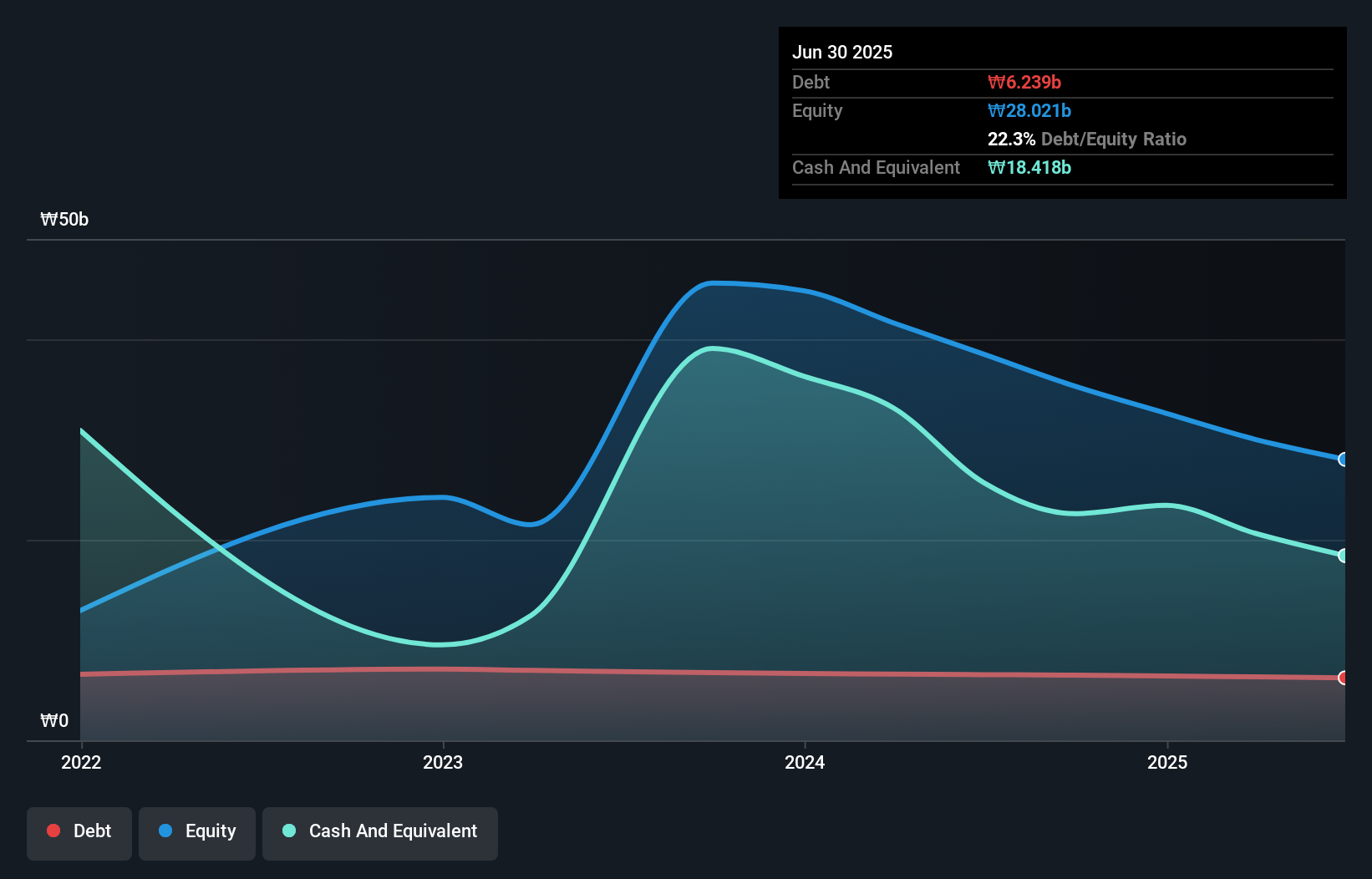The external fund manager backed by Berkshire Hathaway's Charlie Munger, Li Lu, makes no bones about it when he says 'The biggest investment risk is not the volatility of prices, but whether you will suffer a permanent loss of capital.' So it might be obvious that you need to consider debt, when you think about how risky any given stock is, because too much debt can sink a company. We can see that Virnect Co., Ltd. (KOSDAQ:438700) does use debt in its business. But is this debt a concern to shareholders?
Why Does Debt Bring Risk?
Debt is a tool to help businesses grow, but if a business is incapable of paying off its lenders, then it exists at their mercy. If things get really bad, the lenders can take control of the business. However, a more usual (but still expensive) situation is where a company must dilute shareholders at a cheap share price simply to get debt under control. By replacing dilution, though, debt can be an extremely good tool for businesses that need capital to invest in growth at high rates of return. When we think about a company's use of debt, we first look at cash and debt together.
What Is Virnect's Net Debt?
The image below, which you can click on for greater detail, shows that Virnect had debt of ₩6.24b at the end of June 2025, a reduction from ₩6.55b over a year. However, it does have ₩18.4b in cash offsetting this, leading to net cash of ₩12.2b.

How Strong Is Virnect's Balance Sheet?
According to the last reported balance sheet, Virnect had liabilities of ₩8.33b due within 12 months, and liabilities of ₩2.73b due beyond 12 months. Offsetting this, it had ₩18.4b in cash and ₩672.5m in receivables that were due within 12 months. So it actually has ₩8.03b more liquid assets than total liabilities.
This excess liquidity suggests that Virnect is taking a careful approach to debt. Given it has easily adequate short term liquidity, we don't think it will have any issues with its lenders. Succinctly put, Virnect boasts net cash, so it's fair to say it does not have a heavy debt load! There's no doubt that we learn most about debt from the balance sheet. But it is Virnect's earnings that will influence how the balance sheet holds up in the future. So if you're keen to discover more about its earnings, it might be worth checking out this graph of its long term earnings trend.
View our latest analysis for Virnect
Over 12 months, Virnect made a loss at the EBIT level, and saw its revenue drop to ₩4.5b, which is a fall of 29%. To be frank that doesn't bode well.
So How Risky Is Virnect?
By their very nature companies that are losing money are more risky than those with a long history of profitability. And the fact is that over the last twelve months Virnect lost money at the earnings before interest and tax (EBIT) line. And over the same period it saw negative free cash outflow of ₩9.7b and booked a ₩11b accounting loss. But at least it has ₩12.2b on the balance sheet to spend on growth, near-term. Even though its balance sheet seems sufficiently liquid, debt always makes us a little nervous if a company doesn't produce free cash flow regularly. There's no doubt that we learn most about debt from the balance sheet. However, not all investment risk resides within the balance sheet - far from it. Be aware that Virnect is showing 3 warning signs in our investment analysis , and 1 of those shouldn't be ignored...
Of course, if you're the type of investor who prefers buying stocks without the burden of debt, then don't hesitate to discover our exclusive list of net cash growth stocks, today.
New: Manage All Your Stock Portfolios in One Place
We've created the ultimate portfolio companion for stock investors, and it's free.
• Connect an unlimited number of Portfolios and see your total in one currency
• Be alerted to new Warning Signs or Risks via email or mobile
• Track the Fair Value of your stocks
Have feedback on this article? Concerned about the content? Get in touch with us directly. Alternatively, email editorial-team (at) simplywallst.com.
This article by Simply Wall St is general in nature. We provide commentary based on historical data and analyst forecasts only using an unbiased methodology and our articles are not intended to be financial advice. It does not constitute a recommendation to buy or sell any stock, and does not take account of your objectives, or your financial situation. We aim to bring you long-term focused analysis driven by fundamental data. Note that our analysis may not factor in the latest price-sensitive company announcements or qualitative material. Simply Wall St has no position in any stocks mentioned.
About KOSDAQ:A438700
Excellent balance sheet with low risk.
Market Insights
Community Narratives



